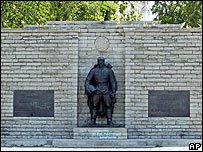
Kevin Philips on big finance:
Economic, financial and regulatory issues should dominate politics and government in the United States for the next two or three years, which is important enough. National discourse may also have a new and deserving bogeyman. Franklin D. Roosevelt had Big Business, Ronald Reagan had Big Labor, and my guess is that the new president inaugurated next January will have Big Finance.
True, finance has been whupped by presidents before. Thomas Jefferson and Andrew Jackson, for example. But that was in the quill-pen era when the financial sector was a pup. Today's financial services sector, by contrast, is a grasping, gargantuan combination of banks, stockbrokers, insurancemen, loan sharks, credit-card issuers, hedge fund speculators, securitization mavens and mortgage operators. Over the last five years, financial services has reached a swollen 20-21% of U.S. GDP -- the largest sector of the private economy.
Manufacturing led financial services by 2:1 back in the 1970s, but by 2006 beaten goods production had shrunk to just 12% of GDP.
Do most Americans understand this? Of course not. Newspaper front pages have shunned any discussion; 60 Minutes has not even spared the transformation sixty seconds, despite its vast implications. This upheaval is probably "the greatest story never told" about the two decades between, say, 1986 and 2006.
Nor was it an economic accident. Computerization was a prequisite, as was the rise of financial mathematics. However, I would say that the two most important underpinnings of financialization lay in the rise of public and private debt as a mainstay of American culture and economics and the perpetual liquidity and bail-out support of the Federal Reserve Board under Alan Greenspan. During Greenspan's 1987-2005 tenure, the sum of public and private debt in the United States quadrupled from just over $10 trillion to $43 trillion. Finance became the industry that was not allowed to fail but was permitted to enlarge and metastasize its behavior almost at will. Regulation was minimal. Favoritism was omnipresent.
The result, alas, has been all over recent headlines. America's biggest ever housing bubble, with 57 varieties of exotic mortgages and home prices now plummeting at rates unseen since the 1930s. The United States turned Credit Card Nation, with a citzenry in thrall to plastic, 20% interest rates and late fees for just about everything. Huge banks like Citigroup feel no shame in paying billion-dollar fines for colluding with Enron's tax and accounting deceits. And since mid-2007, national and world credit markets have been panicked and paralyzed by hitherto obscure instruments -- the stand-outs are collateralized debt obligations (CDOs) -- that not even their designers and packagers can explain.
The bit for his upcoming book.

No comments:
Post a Comment